
As an Emmy-winning producer of Lost, creator of the series The Leftovers, and co-writer of Prometheus, Damon Linedlof has enjoyed wild acclaim and crazy ridicule. Lindelof deleted his Twitter account in 2013 following extreme cyberbullying for his work on The Leftovers and became one of the first major critics of toxic fandom.
None of this has dissuaded Lindelof from taking risks. His latest endeavor, the HBO series Watchmen, adapts the legendary graphic novel by Alan Moore & Dave Gibbons, long considered unadaptable. The series follows the costumed vigilante Sister Night (Regina King) as she investigates a murder linked to white supremacists, an eccentric billionaire scientist and the godlike superbeing Dr. Manhattan.
Watchmen has earned glowing reviews for its subversive take on the superhero genre, sociopolitical commentary and the inclusion of a storyline involving a gay, interracial superhero romance.
Queerty scored some time with Lindelof–a rarity for an LGBTQ publication–to chat about the show, its bold storytelling choices, and how he navigates genre writing in the era of toxic fandom. The season finale of Watchmen airs on HBO December 15.
How about we take this to the next level?
Our newsletter is like a refreshing cocktail (or mocktail) of LGBTQ+ entertainment and pop culture, served up with a side of eye-candy.
The show has been a resounding success. How are you feeling about it all?
Well I’m deeply appreciative of what you said. I’m simultaneously immensely proud of all the hard work that everyone did to make this show. It was not easy to do. The way that I’m wired—and this is not to take anything away from anyone else liking or appreciating the show—the way I’m wired is that it’s very hard for me to grasp the idea that I made it. I did it. You know that baby meme where the baby is clenching his fist like nailed it? I look at people who experience that and think man, I wish I could get some of that. So it’s not that I feel like it’s going to be lost, but I always feel like when something’s going very well, and maybe this is my Jewish heritage, but I feel like at any given moment the rug is going to be pulled out from under me. The higher I go, the greater distance to fall. So there’s a fair amount of anxiety while I’m trying to really appreciate the show and reaction to the show.
Sure.
Any writer, or anyone in the arts of any kind, the sweet spot is where you are trying get something out of you that makes you feel seen. Considering Watchmen wasn’t mine, I wanted the show to feel like Watchmen but I also knew, in order to feel like Watchmen, it needed something original inside it. It’s deeply personal to me. Right now I feel understood. That’s a rare and wonderful thing in my parabola.

Great to hear. And for the record, I’m a total Gentile, and I’m constantly waiting for the other shoe to drop too. So maybe it’s a writer thing.
[Laughter]
That’s a relief. My wife is a Catholic, and she voices it as “I’ve done something to deserve something horrible.” That’s Catholic guilt as opposed to Jewish guilt, which is a general sense of misery.
I’ll have to have you back to do a whole interview on that mentality. There’s a whole conversation there.
We’d never stop talking.
This sequel series introduces the element of racism, which is not at all prominent in the original novel. Maybe that’s a hint that both Alan Moore & Dave Gibbons [author and artist of the novel] are both British. At exactly what point did you decide that the show would focus on that?
Great question. I think that my feeling is that the first instinct was that Watchmen was written in the mid-80s. One of the things that made it resonate was that, unlike a lot of superhero comic books that are set in an alternate world, Watchmen was set in New York. Richard Nixon was still president. So it was dealing with a political reality that was just a couple degrees off of our own, versus Lex Luthor and the Joker are up to no good. It feels real. What the original Watchmen was dealing with was the United States and the Soviet Union on the verge of a nuclear war. When I read Watchmen in the mid-80s, The Day After [a notorious TV movie about the aftermath of a Soviet-American nuclear exchange] had just run.
And nuclear war seemed like a very real possibility.
Yes. And superheroes can’t beat nuclear war. So it made all the characters in Watchmen a little more flawed and pathetic because the “big bad” was undefeatable. So I asked myself, if we’re going to set a story in 2019 and it’s 30 years after the original Watchmen, I’m no longer scared of being nuked by the Russians. So what is the pervasive cultural anxiety in America right now? Everywhere I look, everything I read, is about race. Even though I move through the world as a white man, it was increasingly impossible to not see that afforded me a tremendous benefit.

Absolutely.
I got a much bigger piece of the American Dream cake than other people. So I looked at the original text and realized there is an omission, in that there are no people of color with the exception of Rorschach’s therapist. So it seemed like an interesting idea to write about: where are all the black people in the superhero genre? [I wanted] to make that the question. Right on the heels of that was the revelation: this is not my story to tell. How dare I? So the answer became to collaborate with people of color, not as people under me, but as true collaborators. I know Watchmen like the back of my hand, but as it pertains to this aspect of it, I don’t know what I’m talking about. I like to tell stories when I’m in over my head.
Yes.
That immediately threw me into the deep end. I knew if we got it wrong, it would be harmful. Not that it would just be sh*tty, it could actually hurt people. Once I knew that was the responsibility before us, and decided to do it anyway, we were in it. That was the thinking.
That awesome. That is one of the reasons people are so enthralled with it. It is provocative, and you’re bringing attention to events like the Tulsa Massacre which most people don’t even know about. And that’s scary.
I didn’t until five years ago.
It’s a frightening element of our history that we don’t talk about. Now, as a die-hard lover of the original novel, and as a queer person, a gay man, I was very interested to see how the sexuality of the queer characters would be handled.
Right.
In the book, Adrian Veidt, Hooded Justice, Captain Metropolis and possibly Rorschach are all gay. The element of fetishism is also explored with Nite Owl and Silk Spectre. The sexual awareness of the book is something key and groundbreaking for the time. Was it always a given that you were going to include an exploration of the relationship between Hooded Justice and Captain Metropolis?
Absolutely. The moment we decided that the big idea of this season would be that Hooded Justice would be a man of color, a black man who was the first superhero. Not just a superhero, but the first, the guy who came up with the idea. There was a meta-theme of appropriation. Part of America is built on stealing sh*t from people of color.
Unfortunately yes.
That’s from the land we live on taken from Native Americans to so much of pop culture being taken from African Americans. So to apply the same thinking to superheroing, the challenge became—and as a fan of the original Watchmen, you know—in the ancillary materials, it is very clear that Hooded Justice and Captain Metropolis were in a relationship.
Absolutely.
One of the tricky things is that their relationship is described to us by someone who is homophobic, Hollis Mason [the costumed avenger Nite Owl I]. He’s not woke.

To say the least.
So we had to ask ourselves—nobody is describing the relationship from the inside. Someone from the 1940s and 50s describing two men in a relationship together is going to use very loaded language like “deviancy.” There are also implications that maybe Hooded Justice was into rough stuff, or even pedophilia, which were, as you know, code phrases for people who didn’t understand what it meant to be gay. More importantly, if you were a man, let alone a man of color in the 1930s or 1940s, you don’t even have the word “queer” or “bisexual” or “gay” to describe your attraction to other men. So the idea that Will [Reeves, the true identity of Hooded Justice in the TV series] was very confused by all this, and how exciting it would be for him for a prominent white guy in a position power to not only invite him to join his superhero team but is clearly attracted to him sexually…that’s the story that wasn’t told in the original Watchmen. And there’s something dark in that story, particularly because Captain Metropolis is telling him “You need to hide your race” and is clearly closeted himself. How can we dramatize all of that in four scenes? There’s such a heavy lift in that episode. How can we do it with some degree of responsibility? Those are the things we were striving for.
I love that you include that, and queer people seem to love the episode. I have to say though, I was disturbed by the way the relationship was portrayed. I wasn’t bothered by any of the changes you make to the character of Hooded Justice. And I think I’m in the minority on this issue, but it really bothered me to see the relationship go from one that is pure and loving in the original novel to a coercive one borne out of fetishization.
Yeah.
That said, I don’t think the way you portray the Hooded Justice/Captain Metropolis relationship in the show is outside the bounds of reality. Racism does exist in the queer world, as does fetishization of race. Did you have reservations about portraying their relationship as an abusive or exploitative one?
I first want to say your criticism is very fair. Like all things, as it relates to the original text, we had to ask if Hooded Justice was a man of color, what does it mean for Captain Metropolis extrapolated through that? That said, the initial answer to your question is we really wrestled with all of the above. How elastic is the original test? There’s a thing called “retconning,” retroactive continuity…
I know it well.
You know all about it. We had to admit that’s what we were doing. This certainly wasn’t Alan Moore and Dave Gibbons’ original intent. The other thing we had to determine is that the relationship between Metropolis and Hooded Justice is always being described by others [in the novel]. We never actually hear from Captain Metropolis as to how he felt about the relationship.
That is true, yes.
So the arc we wanted for them was—I think “fetishize” is exactly right. I think Metropolis fetishized the relationship with Hooded Justice at the time it was happening. But then later in life, in order to reconnect with what you just said about the original text, it was something he came to regret or had real perspective on. In hindsight, he realized he loved this man. The way we pay this off is that Will Reeves is now living in Nelson Gardner’s mansion. After Nelson’s death, he willed his entire estate to this man he feels he wronged.
Related: WATCH: HBO drops the first ‘Watchmen’ trailer, and teases a new kind of queer superhero
And I did catch that detail. I was happy to hear it. And as I say, this is my personal reaction as a queer writer, and I think I’m in the minority in that.
No, no, it’s fair. I’ll also say, obviously it’s on-screen that counts, but we have this thing called “Peteypedia,” which like the ancillary materials did in the original Watchmen, has all these documents and memos that the FBI has found, including Nelson Gardner’s last will & testament in which he bequeaths his entire estate to Will Reeves. It speaks to some of the things you and I are talking about right now. And it is canon.
I didn’t know that. There goes my afternoon…
Oh yeah, it’s a deep dive. But I think you’ll find there is some interesting stuff there.
No doubt. Now one thing that really impresses me about your writing in this show, and in general, is the way you write a mystery about a mystery. For example in Watchmen, it is clear there is a mystery unfolding, but it’s a mystery what that mystery even is.
[Long Pause]
I’m just sitting with your question for a second. I do a lot of interviews, and I’ve been doing this job for longer than I care to admit. I’ve heard most iterations of most questions in one form or another before. But this is the first time that anyone has ever asked me that, and certainly the first time anyone so articulately verbalized the idea that the true mystery is what’s the mystery?

Yeah?
As you were asking the question, I was thinking to back when Lost was on. People would walk up to me and ask “What’s the island? What is it?” And I wouldn’t even know how to answer that question, but I think what they were actually asking me was “What is the mystery?” I saw people know how to ask “Where do the polar bears come from?” Or on The Leftovers, “Where did those people disappear to?”
Yes.
What you’re fundamentally scratching at—I’m not a Catholic, but my wife was a practicing Catholic when we met. We went to church and they were talking about “the mystery.” They literally used the word “mystery.” I asked her afterward “Honey, what’s The Mystery?” And she said it was the Holy Trinity and connective threads therein. And I was like, but there is no mystery. Jesus died for your sins, you know why, he came back to life… And she was like we know the answer to the mystery, but we don’t know The Mystery.
Yeah.
And that conversation is really unpacking what you’re saying. There is fundamental anxiety programmed into our DNA as humans. That anxiety is what the f*ck are we supposed to do? What do we do with this life? Why are we here? What’s the purpose behind it all? I am deeply interested in exploring that anxiety. In order to explore that, I have to put it in a Trojan Horse of story. That is the brass ring I’m reaching for constantly, whether it’s obvious or subtextual.
Sure.
So the answer to your question is I can’t answer the mystery of why I’m so driven by mystery other than the fact that I find it really relatable. I’m fascinated by people that are so confident that they’ve figured it all out that they’ve solved The Mystery. But then when you say to them, “How can you solve The Mystery for me?” It’s something they can’t verbalize. It’s almost a feeling. That gets to the heart of the other thing that drives me creatively, which is how do you make something emotional versus didactic? I was never good with philosophy, but I know when I’m feeling something. So how can I use the medium of the story to connect with them based on what I’m feeling?
So in terms of mechanics then, how do you go about layering that into a plot?
I guess the approach is always through the lens of character first. You look at a person and essentially say what does this person want, do they know what they want, and if they can’t answer the question of what they want because if they did, they would go get it, then as a storyteller, I feel like most humans are missing something. What is that thing they need in order to be whole? If I can identify it, then I can understand how to write that.

Marvelous. The reaction to the show has been overwhelmingly positive. But maybe this would be a good point to ask about toxic fandom, which has just gotten so far out of control. I remember the stir when you deleted your Twitter account in 2013.
A little bit.
Things, in short, have not gotten better, and as a lifelong geek myself, I’m constantly horrified. As a member of the media I’ve been targeted as well. Where does this come from? Where does this entitlement come from? How do we combat it?
I don’t know the answer to the second part of the question, how we combat it. If I knew the answer, I think I’d be able to answer why we’re in a divided culture right now. Why is vitriol our default position? We’ve lost the ability to have deeper, more probing conversations to understand each other better. Social media is a big part of the problem.
For sure.
Just because I deleted my Twitter account doesn’t mean I don’t have Instagram or that I am reliant on my phone as a way of communicating. Even for those of us who have ever been in love, even when we’re texting the people we love most, sometimes our texts are misinterpreted as hostile.
Yes.
And that’s someone that you know and trust. Now let’s extrapolate that same level of communication from strangers. The default position is defensiveness. The antidote to defensiveness is offensiveness, and that’s the culture we now find ourselves in. But I think the root of the toxic fanbase is that we are all protecting this thing that we love. So if you’re a fan of a sports team, or a fan of Magneto, ultimately the part of it is that you want to be able to make fun of it. But when you make fun of it, you do it with love. But it doesn’t feel like love when you say “That was a sh*tty episode.”
Interesting.
That’s the source of it. I find the people who really didn’t like an episode of Watchmen don’t feel a need to go on Twitter and tell the world about it if they didn’t love it. The toxicity that you and I are really talking about right now—the root of it is I love this thing and I feel a need to protect it. Or, someone doesn’t love it as much as I do. Or [someone is] exploiting it and I need to protect it. When I feel toxic in my fandom, when I feel that feeling inside me, I take a deep breath and remember it’s me feeling protective, but this person who may have gone down a different road than I would have loves it too.
Right.
We can agree to disagree on the approach. But how can I be mad at someone for loving it as much as I do?
I love that you use the term “exploit” there. I feel like that’s really key to part of this. We live in a time of sequels, prequels, reboots, revivals, and reduxes that cancel out other sequels and reboots. There’s something from a business standpoint that is exploitative about that. It makes me wonder if that’s just a natural reaction of “don’t take away what I love.”
Right.

Do you think it’s also possible that the audience has now been conditioned to expect a kind of fan service? I know you’re close with JJ Abrams, so I hate to use the example of The Force Awakens, but it’s a clear one. Watching that movie drove me crazy as a fan because it seemed preoccupied with nostalgia and stoking the fan ego. It’s like it was trying to say “Aren’t you smart for getting all these in-jokes.” So, without picking on Mr. Abrams or anyone else, do you think that kind of pandering results in toxic fandom?
That’s such a good question. The short answer is I don’t know. At a certain point, it’s like the word “binge.” Up until a decade ago, it was a bad word. It was synonymous with eating too many potato chips, like I ate the entire bag and now feel guilty and physically ill.
[Laughter]
Right.
Then when it comes to consuming episodes of a TV show, it’s something we’re all proud of. “I watched an entire season of Stranger Things in 10 hours!”
True.
The same is true of fan service. It sounds like a good thing. You want to acknowledge the insiders. If you’re making a Star Wars movie, and someone has a 30-year-old romance with Star Wars, there should be stuff in the movie that resonates more with them than someone who walks in off the street. You want to acknowledge someone’s obsession. Of course, this stuff is also now being made by fans. Whether or not you have quibbles with JJ’s Star Wars or Rian Johnson’s Star Wars, no one can say those two guys aren’t fans.
Absolutely right.
Then baby Yoda comes along in The Mandalorian, and everyone loses their minds. But it’s fan service. It’s Yoda, a character we adore in baby form. That’s a home run across the board. Anyone who doesn’t like baby Yoda, I don’t understand.
[Laughter]
So, it’s interesting. I agree with you. There is a line you can cross where it suddenly feels like you’re pandering, that it’s no longer authentic, that they’re using nostalgia to trick you. Where that line is, is subjective. It’s different places for different people. When we were talking about Watchmen, we were hyper-aware of where that line was for us.
Yes.
Different writers in the writer’s room, their minds were in different places. So as long as we felt like we weren’t crossing over each other’s line, we thought maybe the finished product would be on the right side of it when the show airs. But you don’t know until you start down that path.

Along those lines, one element I really love in the show is the way it echos the original novel without repeating it. So, for example, like the novel, you have a murder mystery with a costumed hero, but it’s under very different circumstances, and with a very different outcome. How do you strike a balance?
Very carefully. It was a very delicate process. You want to have the energy of the bull in a china shop because that’s what the original Watchmen has. At the same time, you’re like, get that energy but don’t break anything. I think for us, we knew we’d break stuff but then pick it up and meticulously Crazy Glue it back together and put it back on the shelf. We can’t leave the china shop in tatters because we love it so much. The original Watchmen, and I think you would agree as a fan, did this amazing thing where it simultaneously revered the Golden Age of superheroes, and at the same time, it was trolling it.
Yes!
And so we had to do that with the original. We had to revere the original Watchmen but also troll it. But troll it in such a way where we’re sort of busting Watchmen’s chops versus being mean to it. That’s where we come back to “very carefully.” If it ever felt like we weren’t in complete and total love with the source material, the idea went onto the junk pile. We adore this thing, but that adoration would have limited us from making something new. When you’re adapting something, you have to honor why it’s worthy of adaptation, but at the same time, “adaptation” means what it means: change. Adaptation means change, not do the same thing. So how much to change, how to change, when to change…that was the experiment every single day. Sometimes we got it right, most times we got it wrong. But we had each other’s backs and built enough trust to say to one another “We have to do better.”
Good to know someone still tries.
The season finale of Watchmen airs on HBO December 15. The series is available to stream on HBO Go.



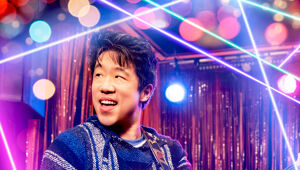
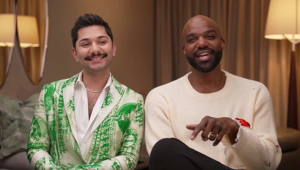
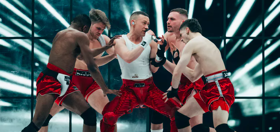


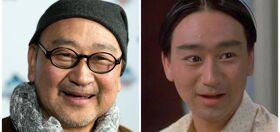


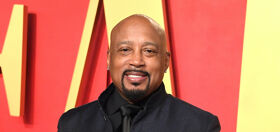
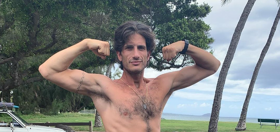





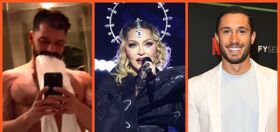
Selverd
I would have asked him if H.J. was supposed to be gay like he was in the comics, or if they made him bisexual,
And we only get bits and pieces of their relationship in the comic, but Larry’s letter to Sally in #9 doesn’t make it sound “pure and loving.”
RIGay
Honestly… I am just not into these anarchy-themed shows. Don’t care who’s gay or drops trou in each episode. There is so much… bad stuff… going on in the real world, I don’t need to lock myself into a fictional narrative for and sake of entertainment.
inbama
Terrific show.
Great cast playing beautifully scripted characters – it was absolutely riveting.
And how amazingly timely as the discovery of mass graves from the Tulsa massacre was just announced.